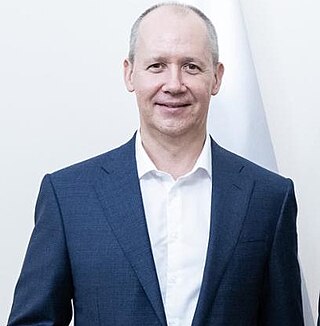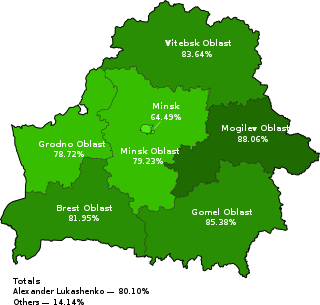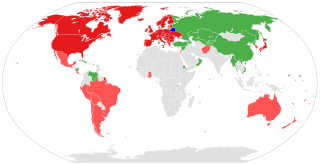 |
|---|
The 1999 Belarusian presidential election was a political protest action by members of Belarusian opposition who did not recognise the 1996 constitutional reform which extended Alexander Lukashenko's presidential term.
 |
|---|
The 1999 Belarusian presidential election was a political protest action by members of Belarusian opposition who did not recognise the 1996 constitutional reform which extended Alexander Lukashenko's presidential term.
The 1996 constitutional amendments created the bicameral National Assembly of Belarus to replace the Supreme Council, which was a stronghold of opposition towards populist president Alexander Lukashenko. Another amendment extended incumbent Alexander Lukashenko's term for another two years and as a result, the next election moved from 1999 to 2001. [1]
On 10 January 1999, a meeting of 43 former deputies of the Supreme Council of Belarus was held. In accordance with 1994 Constitution, they called presidential election on 16 May 1999, as from Council's point of view Lukashenko's term was due to end in July. To organize the election, the Supreme Council appointed an alternative Central Election Commission headed by Viktar Hanchar. [2]
On 13 February 1999, the Belarusian Popular Front nominated Zianon Pazniak as its presidential candidate. [3]
On 1 March 1999, former prime minister Mikhail Chigir announced his intention to run as an independent candidate. On 29 March, he stated that 132,038 signatures had been submitted to the election commission in his support. According to Popular Front deputy chairman Lyavon Barshchewski, 114,000 signatures were gathered in support of Pazniak. [3]
On 31 March, Viktar Hanchar presented certificates of presidential candidates to heads of Chigir and Pazniak campaign headquarters, as Mikhail Chigir was arrested 30 March, and Zianon Pazniak has been in political exile since 1996. [4]
The election was held from 6 to 16 May 1999 without opening polling stations or compiling voter lists, because due to the measures taken by the authorities loyal to Lukashenko, it was not possible to organize classic polling stations. Election commission members visited voters' homes with ballot boxes. It then became clear that such election cannot meet OSCE standards, it will not be possible to invite international observers, and the candidate who receives the most votes will not be recognized internationally as the new president. [5]
On 7 May 1999, one of the opposition leaders, the former minister of internal affairs Yury Zacharanka, went missing. [5]
According to Hanchar's election commission, out of 7.5 million Belarusians eligible to vote, over one million people voted in the first three days. After the voting started, Zianon Pazniak withdrew his candidacy due to "numerous violations by Hanchar during the campaign". Pazniak's decision provoked criticism from some of his party members and subsequently split the Belarusian Popular Front. [3]
At a press conference on 19 May 1999, Hanchar declared election invalid due to "violations committed during the voting". None of the candidates received more than 50% of the vote, with Pazniak closest to win. The exact data on votes cast for each candidate was not announced. 53% of Belarusians allegedly took part in the voting, [6] although due to mass arrests of activists by Lukashenko-controlled police and withdrawal of People's Front representatives from local election commissions, voting process was paralysed. During the campaign, Hanchar's commission was subject to serious criticism. Reports on turnout were questioned both by the regime and the opposition. [7]
On 21 August 1999, deputies of the Supreme Council appointed its last chairman Syamyon Sharetski acting president of Belarus.

Alexander Grigoryevich Lukashenko is a Belarusian politician who has been the first and only president of Belarus since the establishment of the office on 20 July 1994, making him the longest-sitting European president.

The BPF Party is a political party in Belarus. It was de facto established after the split of the social movement Belarusian Popular Front in 1999. The Belarusian Popular Front was founded during the Perestroika era by members of the Belarusian intelligentsia, including Vasil Bykaŭ. Its first and most charismatic leader was Zianon Pazniak.

Belarus elects on national level a head of state—the president—and a legislature. The president is elected for a five-year term by the people. The National Assembly has two chambers. The House of Representatives has 110 members elected in single-seat constituencies elected for a four-year term. The Council of the Republic has 64 members, 56 members indirectly elected and eight members appointed by the president.

The Conservative Christian Party of the Belarusian People's Front is a political party in Belarus that opposes the government of president Alexander Lukashenko. It was de facto formed after the split of the Belarusian People's Front in 1999.

The Belarusian Presidential Guard or officially the Presidential Security Service is a law-enforcement body that was designed to protect the President of Belarus and other high-ranking officials and officers.

Zianon Stanislavavič Pazniak is a Belarusian nationalist politician, one of the founders of the Belarusian Popular Front and leader of the Conservative Christian Party – BPF. He was the Belarusian Popular Front nominee for President of Belarus in the 1994 election.

Presidential elections were held in Belarus on 19 March 2006. The result was a victory for incumbent, President Alexander Lukashenko, who received 84.4% of the vote. However, Western observers deemed the elections rigged. The Organization for Security and Co-operation in Europe (OSCE) declared that the election "failed to meet OSCE commitments for democratic elections". In contrast, election observers from the Commonwealth of Independent States (CIS) described the vote as open and transparent.

A four-question referendum was held in Belarus on 14 May 1995, alongside parliamentary elections. The four issues were the possibility of giving the Russian language equal status with Belarusian, whether new national symbols should be adopted, whether there should be economic integration with Russia and changes to the constitution that would allow early elections if Parliament systematically violated the constitution. According to official results, all four were approved by at least three-quarters of voters, with a turnout of 64.8%.

A seven-question referendum was held in Belarus on 24 November 1996. Four questions were put forward by President Alexander Lukashenko on changing the date of the country's independence day, amending the constitution, changing laws on the sale of land and the abolition of the death penalty. The Supreme Council put forward three questions on constitutional amendments by the Communist and Agrarian factions, local elections and the national finances.
Viktar Hanchar, or Viktar Hančar was a Belarusian politician who disappeared and was presumably murdered in 1999. He was born in the village of Radzichava, Slutsk Raion.

Presidential elections were held in Belarus on 19 December 2010. The elections were had originally been planned for the beginning of 2011. However, the final date was set during an extraordinary session of the National Assembly on 14 September 2010.

Lidia Mikhailovna Yermoshina is a Belarusian politician. She was a member of the Central Election Commission of Belarus (1992–1996), and Chairwoman (1996–2021).
Mikhail Mikalayevich Chigir is a Belarusian politician who served as the second Prime Minister of Belarus from 21 July 1994 to 18 November 1996.

Presidential elections were held in Belarus on 11 October 2015. Long-term president Alexander Lukashenko ran for his fifth term in office, having won every presidential election since independence in 1991. He was re-elected with 84% of the vote, according to official figures. The 'against all' option received more votes than any opposition candidate.

Valery Tsepkalo or Valery Tsapkala is a Belarusian politician, diplomat, executive, and entrepreneur. He holds a Candidate's degree in International Law.

Presidential elections were held in Belarus on Sunday, 9 August 2020. Early voting began on 4 August and ran until 8 August.

Viktar Dzmitryevich Babaryka is a Belarusian banker, philanthropist, public and opposition political figure who intended to become a candidate in the 2020 Belarusian presidential election. He is considered a political prisoner after having his candidacy rejected, followed by being detained by the Belarusian government over charges of "illegal [financial] activities" that are considered to be politically motivated.

The following is a list of the official reactions to the 2020 Belarusian presidential election and the surrounding 2020 Belarusian protests.

The most infamous cases of people's disappearances in Belarus have occurred during the presidency of Alexander Lukashenko. For the most part, the people who have disappeared have been opponents of the president. They are considered cases of forced disappearance.

Illia Salei is a Belarusian lawyer and political figure, member of Viktar Babaryka's team and presidential campaign office at time of the 2020 Belarusian presidential election. Attorney of presidential candidates Viktar Babaryka and Sviatlana Tsikhanouskaya, as well as an opposition leader and a member of the presidium of the Coordination Council of Belarus Maria Kolesnikova. Recognized as a prisoner of conscience by Amnesty International.